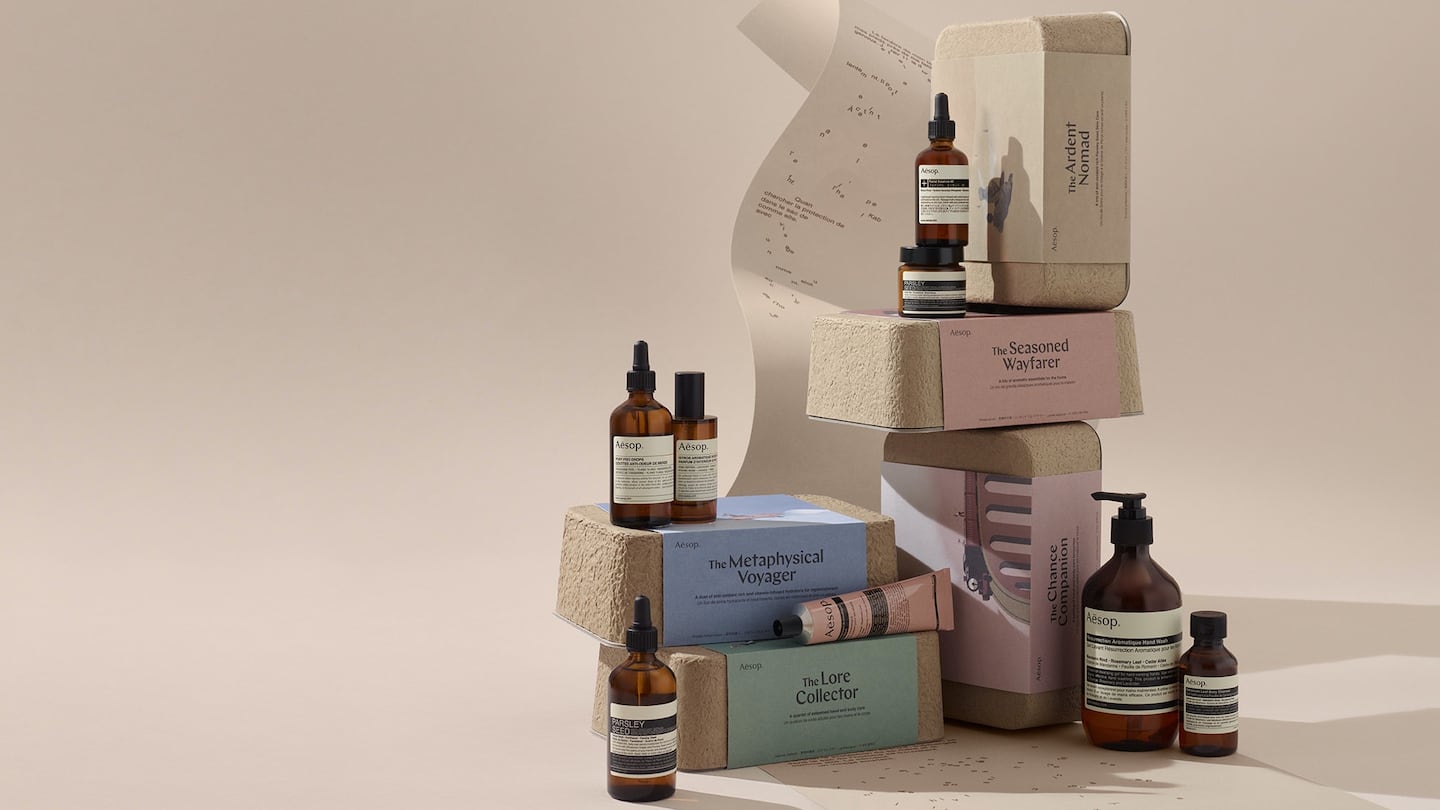
The Business of Fashion
Agenda-setting intelligence, analysis and advice for the global fashion community.

Agenda-setting intelligence, analysis and advice for the global fashion community.

LONDON, United Kingdom — Aesop, the luxury personal care brand known for its utilitarian iodine-brown packaging and $50 soaps, is having a relatively good pandemic. But as competition heats up in the personal care sector, the company's betting on a digital pivot and amped-up sustainability initiatives to remain relevant.
Over the last few months, the company has pushed ahead with efforts to operate in a more environmentally responsible manner. It has made good on its plan to become a B-Corp by the end of 2020, an achievement three years in the making, and by 2025 it plans to have 100 percent of its packaging reusable, recyclable or compostable. In late September it piloted a refill programme in one of its Adelaide, Australia stores following the success of its “rinse and return” initiative in Hong Kong, and the brand’s first product collaboration with circular fashion designer Christopher Raeburn, still closely under wraps, will debut early next year.
Over the next two years, the company plans to pilot and scale a host of projects that will drive its commitments further. The decision to continue pressing ahead with these efforts came swiftly after the pandemic hit.
“When we saw that, actually, we were okay and we were going to be able to work through it, it was then [a question of] thinking, ‘Okay, how do we really position ourselves for that post-Covid world?’” said Michael O’Keeffe, Aesop's chief executive. The brand made the obvious accelerated investment in digital channels, but “we didn't want to pull back on [sustainability] initiatives either,” he said.
ADVERTISEMENT
The move reflects increasing interest from consumers in the sustainability credentials of the brand and products they choose to spend on. According to an April 2020 consumer survey by McKinsey & Company, 57 percent of respondents have tried to lessen their environmental impact through lifestyle changes, and 60 percent have gone out of their way to buy products with more sustainable packaging.
“It’s an investment in the longer-term value of the brand,” said Rebecca Robins, global chief learning and culture officer at brand consultancy Interbrand, in an email exchange with BoF. “This is an investment in staying close to their customers, in anticipating their evolving needs and playing a meaningful role in customers’ lives and making these brands more resilient in a time of crisis.”
It's an investment in the longer-term value of the brand.
It’s not the only pivot Aesop has made in the pandemic. Before the coronavirus hit, nearly three-quarters of Aesop’s revenue came from direct in-store sales. The company has historically relied on in-person experiences to court its consumer base of cosmopolitan Millennials — from scrupulously planned retail locations designed to suit their hip neighbourhood settings, to filling the bathrooms (and in some cases, air) of trendy social hotspots like hotels, clubs and restaurants.
But when lockdowns forced roughly 90 percent of its 247 global stores to shut for a period earlier this year, it rapidly changed tack. E-commerce sales increased 430 percent in the second quarter of 2020 compared to the same period last year and made up 37 percent of total sales.
The brand scaled its live chat and virtual customer service consultations globally (“literally sending PCs and cameras and the like out to [sales associates’] homes,” said O’Keeffe), turned some offices into recording studios, established click and collect in some stores, and turned others into fulfilment centres to accommodate for the boom in online sales. The company has even increased its net headcount by about 10 to 20 percent, at a time when many were cutting their workforce, to reflect investment in digital and IT infrastructure, as well as rapid growth of its business in east Asia.
While premium beauty and personal care is projected to contract by about 11 percent globally to about $44.8 billion this year, according to preliminary data from market research firm Euromonitor International, Aesop’s sales rose about five percent at constant currencies in the first half of the year. Parent company Natura cited Aesop and stablemate The Body Shop as key drivers of the group's resilience in the second quarter of this year.
The company’s pandemic investments are a savvy bet on consumers trends in a market that is only likely to become more competitive, analysts said.
“The trends we're seeing in the luxury personal care arena are focused on sustainability, transparency [and] digital,” said Natasha Cazin, beauty and fashion consultant at Euromonitor. “Aesop’s had a good grasp of this.”
Related Articles:
[ Can Aesop Keep Its Cool?Opens in new window ]
[ Natura Sees E-Commerce Growth Amid Coronavirus CrisisOpens in new window ]
[ How Beauty’s Cultiest Cult Brand Plans to Grow Without Selling OutOpens in new window ]
Excitement for its IPO is building, but in order to realise its ambitions, more acquisitions and operational expenses might be required.
In an increasingly crowded space, makeup brands that prioritise natural ingredients are finding new ways to get their message across.
Shana Randhava, Priya Venkatesh, Heela Yang and Robin Tsai will join Imran Amed and Priya Rao to identify the entrepreneurs shaping the future of the beauty industry.
By selling existing formulas under their own name, retailers can tap into the lucrative beauty market without investing in custom formulations. But that doesn’t mean the private label model is an easy win.